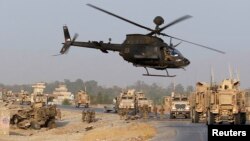As the 28 members of the North Atlantic Treaty Organization (NATO) are preparing for their summit meeting in Wales next week, its role in Afghanistan looms large on the agenda.
NATO has been operating in Afghanistan since 2003, leading a 44,000-member U.N.-mandated contingent known as the “International Security Assistance Force.”
NATO has three missions in Afghanistan.
The first is to assist the Afghan government in its efforts to rebuild and stabilize the country. The second is to train the Afghan army and police. And the third mission is to hunt down and eliminate insurgents in southern Afghanistan, stronghold of the Taliban which was ousted from power by a U.S.-led coalition in 2001.
NATO'S combat mission ending
But NATO’s combat mission in Afghanistan ends in a few months.
Retired Admiral James Stavridis, former Supreme Allied Commander at NATO, said the NATO summit will tackle the question: what next?
“How we shift the mission from the ‘Operation Enduring Freedom’ to the ‘Resolute Support’ mission - much smaller, about 15,000 troops, 10,000 U.S., about 5,000 Europeans - who will remain to train and work with the Afghan national security forces,” said Stavridis, who is dean of the Fletcher School.
Stavridis is cautiously optimistic about Afghanistan’s future. He said there are some positive signs, including a growing economy and the fact that more than 300,000 Afghan security forces have already been trained by NATO.
“Don’t mistake my cautious optimism for a sense that everything is perfect,” he said. “There are enormous problems with corruption, with narcotics, with neighbors who create disturbances - both Iran and Pakistan - so there are many challenges.”
Defense spending slashed
Another issue facing the NATO leaders is burden-sharing when it comes to defense spending. For years, the United States has urged European nations to spend more on defense but with little success.
Ohio Wesleyan University NATO expert Sean Kay said European governments were slashing defense budgets at a time Washington urged them to increase those expenditures.
“Americans tend to lecture the European allies that they should spend more on defense, but on the other hand we provide the basic military architecture for NATO,” he said. “ For example, we went to war in Libya, the idea was to get the allies out front through NATO, but the United States had to provide the primary enabling forces for the military operation.”
Kay said the Europeans know the United States will take care of any defense spending shortfall.
“So the question then is not how we can work in NATO to get more spending out of the allies, because given the eurozone crisis that’s just not realistic. The real emphasis needs to be on how do we work with the allies to get them to better pool their existing capabilities so that they can be out front providing for the primary role in the peripheral conflicts that challenge Europe today,” he said.
No new NATO members
Experts say one issue the NATO summit will not address is enlarging the alliance.
“It is fair to say that it is a flat proposition at the moment which means that I don’t see any near-term candidates. Probably the closest to in the queue would be Montenegro, a very small nation and perhaps Macedonia if they can overcome the name dispute they have with Greece,” Stavridis said.
In 2009, Albania and Croatia became the last two countries to join NATO.
Afghanistan Looms Large on NATO Agenda





